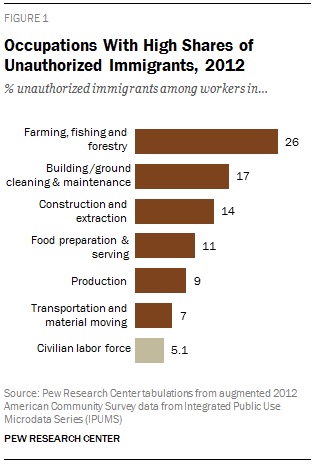Guest Worker Program
Alleviating illegal immigration with freedom.
By JOE TASSINARI DEC. 1, 2016
Q: How do you get 11 million undocumented workers to leave the country voluntarily?
A: Make it legal for them to be here.
“There’s no need for a border wall.”
Building a wall between the USA and Mexico to secure the border has several flaws – the obvious ones being tunnels and 22-foot ladders. More so, a wall would represent an obtrusive symbol of divisiveness between our neighboring countries and obscure the benefits of treating each other with respect and civility.
John F. Kennedy in his Inaugural Address referred to Mexico and nations beyond as “Our sister republics south of our border”. Being inclusive all countries, especially our next-door neighbor Mexico, as part of a global extended family demonstrates a cooperative spirit of fellowship and good will. Rather than fomenting an adversarial relationship with a wall, the USA could promote a good neighbor relationship with cooperation and friendship.
To keep out undesirables (terrorists, criminals, etc.), the United States can secure the southern Mexican border the same way the northern Canadian border is secured; i.e., utilize the preventative intelligence gathering of the CIA, the ground forces of the Border Patrol and FBI, in cooperation with the Mexican and USA state departments. In other words, employ existing best practices to keep unwanted persons from entering across either of the U.S.A.’s contiguous borders. Both the northern and southern borders can remain “wall free”.
But what about the illegal immigrants who enter from the southern border? First off, if undocumented workers are “illegal immigrants” please consider that it takes two to tango. Illegal workers need illegal employers; i.e., United States citizens who are breaking the law by hiring them. If there were a true desire to stop undocumented workers, the cheapest and most efficient method would be to penalize the business people doing the hiring.
The truth is, business people want the financial advantage of undocumented labor and the undocumented laborers want the financial advantage of working in the United States. In fact, many business leaders in several sectors have proclaimed that the viability of their industries depend heavily on such workers. Let congress pass legislation to make legal what is already happening with the creation of a federal Guest Worker Program.
 Guest Worker Program – detailed legislation making it permissible for foreign workers to gain the advantage of higher U.S wages and U.S. industry to gain the advantage of lower wages for jobs that need to be done yet aren’t being filled by U.S. citizens. According to Pew Research Center these jobs are in farming, construction, food preparation and so forth.
Guest Worker Program – detailed legislation making it permissible for foreign workers to gain the advantage of higher U.S wages and U.S. industry to gain the advantage of lower wages for jobs that need to be done yet aren’t being filled by U.S. citizens. According to Pew Research Center these jobs are in farming, construction, food preparation and so forth.
This article is an outline, a fundamental sketch, illustrating the parameters and ultimate feasibility for allowing foreign born, non H-1B Visa workers, to enter the U.S.A. legally. Think of this article as a beginning step to get the conversation going about eliminating a problem and replacing it with a solution. As you read, please note that although many details would need to be ironed out, this is a solution-oriented, win-win proposition.
Guest Worker Program
Administrated by Federal Government – Guest Worker and Guest Worker Employer privilege could be administered under the U.S. Department of Labor in cooperation with the U.S. Boarder Patrol and all other necessary civic and foreign partnerships.
Not a method to attain citizenship. There is already a 10-step process for nonresidents to attain citizenship. The Guest Worker Program would be a lawful method for non-citizens to work within U.S. borders and U.S. industry to hire non-citizens workers – hereby referred to as Guest Workers. How lovey it will be to replace “Illegal Alien”, “Illegal Immigrant” or “Undocumented Worker” with the sweet sounding title of “Guest Worker”. Though Guest Worker status would not be a direct pathway to citizenship, good standing as a Guest Worker over a period of time could be viewed a favorable asset when applying for citizenship.
Must be 18 years of age or older. Children, under 18 years of age, are not allowed to apply or accompany an adult guest worker. This is not a babysitting service; this is for reliable non-citizen working adults who wish better the lives of themselves and their family with a provisional “Guest Worker” opportunity.
Must apply from outside USA. Non-citizen adults must apply and re-apply for guest worker privilege from outside the borders of the United States. Upon inception of the guest worker program, existing non-citizens would need to leave the U.S. borders to attain privilege. The USA’s four closest neighbors, Mexico, Canada, Russia and Cuba, could establish new industry with designated “Hub Zones” for housing people and providing other ingress services like translation, food and paperwork assistance. For instance, an undocumented worker from China or Honduras could travel to a Mexican “Hub Zone” rather than return to their more distant place of origin to apply.
Guest workers must attain sponsorship from qualified U.S. employers. Guest Workers must have a place of employment to qualify; i.e., they must have a landing place where Guest Worker employment is needed. Someone could start up a multiple listing service of Guest Worker jobs and make this available in the Hub Zones for people to peruse. For instance, ACME Farms in California might advertise for 620 vegetable harvesters, while BrandX Meat Packing in Colorado advertises for 350 meat processors.
Credentials must be secured before entry. Upon approval, Guest Workers would provide the proper documents to Boarder Patrol and enter the U.S. as welcomed guests. New businesses could spring up in and around U.S. border towns (e.g. Lukeville, AZ, Loredo, TX, etc.) providing motels, feeding and clothing the welcomed guests while they await transport. Bus companies would gain business providing air-conditioned transport with bathrooms to destinations around the country. No longer will workers have to hide in ship containers, risk a desert crossing, or pay “Coyotajes” and other “Human Smugglers” from $4,000 – $75, 000 to sneak them into the United States. They could enter the U.S.A. in partnership and freedom.
Can stay for 6-month segments. Guest Workers would have to leave the USA after their work is finished and not stay for longer than 6 months. After 6 months, Guest Workers would leave the USA for a minimum of 1 month and either go home to be with family to re-apply, or re-apply from a Hub Zone (where their families could come and visit them).
No Guest Worker may enter the USA pregnant or have a baby in country. If a Guest Worker gets pregnant in country they may not have their baby on U.S. soil. They would report the pregnancy to their employer and make arrangements to leave the U.S. before the child is born. If they give birth within U.S. borders they would be immediately deported, permanently lose their Guest Worker privilege, not be allowed back and be disqualified for any future citizenship requests. Even though the baby would become a U.S. citizen jus soli, the baby (who needs parents), would be deported with them. The jus soli citizen could return, if desired, when he/she becomes an adult. The idea here is to separate workers from citizenship seekers.
Guest Workers are not citizens. As such, they would not qualify for Social Service benefits (welfare aid, public school, Medicaid, Social Security, etc.) or participate in many civic privileges (voting, petitioning, etc.) granted under the U.S. Constitution. They would be able to use public places like roads (with a valid Drivers License and insurance) parks, beaches, etc. and partake in private business like grocery stores, movie theaters, et al.
Pay. This is tricky because as of this writing some “undocumented workers” are paid piecework (by the bushel, etc.) and some paid hourly. An hourly minimum wage would need to be established that synchronizes with piecework pay. Also, Guest Workers and their employers would need to chip in for the cost of living in country (police, fire, roads, libraries, etc.) and pay for the Guest Worker Program.
Let’s say that the wage is established at $11 per hour. The Guest Worker would keep $10/hour and $1/hour would go to taxes. If there were 5,000,000 Guest Workers, $5 million per hour would go to taxes. The Guest Worker Employer could pay an additional $2/per worker/day in country. Distributing the taxes to city/county, state and federal government would need to be calculated but could look something like this: City/County – 50% (local services rendered), State – 30% (state services rendered) Federal – 20% (Guest Worker Program, audits, enforcement, collaboration, and other federal services)
Guest Worker Employers would not pay typical employment taxes but would be responsible for the well-being of Guest Workers ensuring employment with quarterly reporting and tax payments. Additionally, the onus of 1st aid, housing, respectful treatment and other requirements would fall upon the employer. Mexican consul to Washington state, Roberto Dondisch, has reported fair treatment of Mexican Guest Workers participating in Washington’s H2-A program.
How many? President-elect Trump has stated that he will direct the Department of Labor to “investigate all abuses of visa  programs that undercut the American worker”. Much work will need to go into determining how many Guest Workers are needed for the benefit of the United States and it’s citizens. The number will drift higher and lower over time but accurate calculations are possible. Careful consideration will be necessary to ensure that the Guest Worker Program compliments employment opportunities for citizens and does not diminish them. This proposal’s ultimate claim is that a Guest Worker Program is fundamental for economic and social health, as a benefit, to the American people.
programs that undercut the American worker”. Much work will need to go into determining how many Guest Workers are needed for the benefit of the United States and it’s citizens. The number will drift higher and lower over time but accurate calculations are possible. Careful consideration will be necessary to ensure that the Guest Worker Program compliments employment opportunities for citizens and does not diminish them. This proposal’s ultimate claim is that a Guest Worker Program is fundamental for economic and social health, as a benefit, to the American people.
Enforcement would be levied upon the Guest Worker and Employer equally. The United States would want Guest Workers & Guest Worker Employers who are excellent at following rules and obeying the law. If a Guest Worker breaks a rule or law it would be a demerit on their ability to return and a demerit on the Employer’s privilege to continue hiring Guest Workers. This will force employers to onboard Guest Workers who are not only good workers, but also good guests. Much work will need to go into remediation of civil tort, injury and other possible malfeasance, but the responsibility should lay primarily with the U.S. citizens (businesses) hiring the Guest Worker.
Freedom. While in country Guest Workers could mingle, shop, recreate, work, etc. as welcomed guests in the USA. No more sneaking around or operating on the fringes of society. Guest Workers would be appreciated as welcomed contributors, partnering to help make the United States efficient, productive and good place to be. Employers would no longer have to hide their doings and operate outside the law.
~
Oh my this sounds complicated! Really? Look at what’s been happening over the past 50 years with “illegal immigration”. What the USA has been doing is complicated!
“If you find yourself in a hole, stop digging.” ~ Will Rodgers
This Guest Worker “idea” if implemented would at least stop the present-day problems created by illegal hiring and illegal labor from continuing to grow. More so, it would deliver a responsible platform of cooperation and civility between nations and people of the world. I encourage United States citizens and our newly elected government to redact the idea of a Mexico/USA border wall and replace it with a “win-win” Guest Worker solution, allowing employers and non-citizen workers to exist in country with dignity and freedom.
 Joe Tassinari is an organizational & leadership development instuctor and team coach with Business Works, Building Posiitve Workplaces through Staff Training. Thank you Scotty Scheu & Chon Garcia for your contributions and guidence.
Joe Tassinari is an organizational & leadership development instuctor and team coach with Business Works, Building Posiitve Workplaces through Staff Training. Thank you Scotty Scheu & Chon Garcia for your contributions and guidence.

